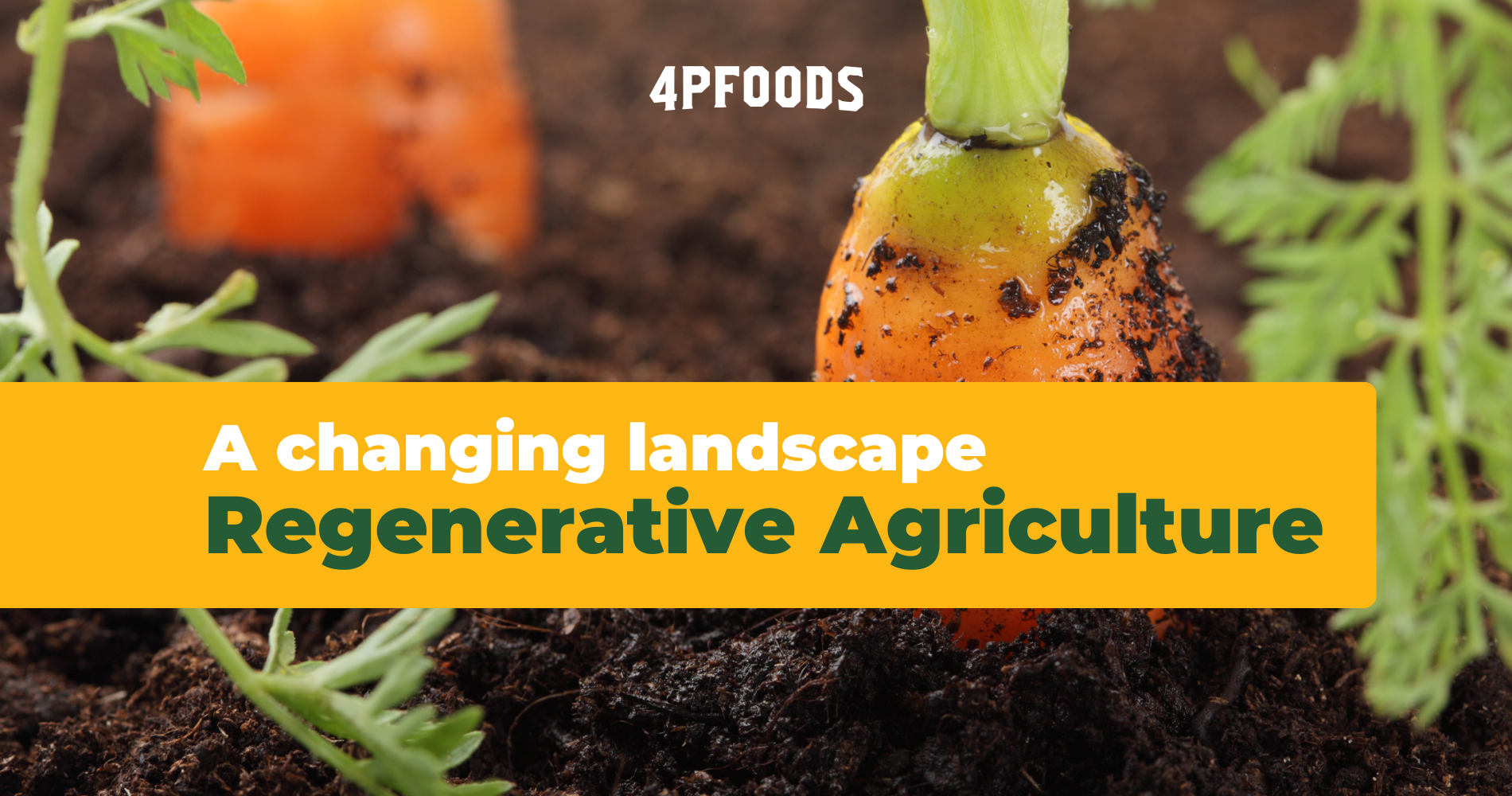
A Changing Landscape: Regenerative Agriculture
January 16, 2025 by 4P Foods
Regenerative agriculture is a growing and changing landscape that can include different practices based on what crop or livestock the farm is raising. Imagine a farm that not only produces scrumptious and nutritious food but also works like a natural ecosystem, buzzing with life and energy. That’s what regenerative farmers strive for – a balance that supports all life forms.
Regenerative farms are looking to:
- Promote biodiversity. Mono-cultures are extremely rare in nature and are not beneficial to an ecosystem. By keeping more than one species in a pasture or by rotating crops and cover crops, growers can mimic a diverse ecosystem. Therefore, working with nature instead of against it.
- Build soil health. With practices like high-density rotational grazing, no till practices, and experimenting with growing more native edible plants (like Patagonia Provisions Kernza), farmers are preventing erosion and helping build organic matter in the soil and giving a better foundation for the ecosystem.
- Sequester carbon in the soil. Soil carbon sequestration is a process in which CO2 is removed from the atmosphere and stored in the soil carbon pool. This process is mainly accomplished by plants during photosynthesis, which is why it is important to keep plants in the soil. Soil Organic Carbon (SOC) has been steadily declining since the industrial revolution and the increase is large scale monoculture crop and livestock production. This means more carbon is in our atmosphere.
“Regenerative agriculture means a shift away from a food supply that is based on degradation, exploitation, and extraction. And, none of this is new! Some of the exciting technologies associated with regenerative agriculture may be recently developed, but the foundational practices are based on ancient and Indigenous principles and wisdom. Rather than shifting yet further away from our roots, we’re shifting back as we move forward.”
-Amanda Mac De Villiers, 4P Foods Head of Procurement
Building Soil Health in Virginia
Kinloch Farm is on over 3000 acres of protected and historic farmland in Virginia’s Piedmont. Kinloch Farm proudly operates at “the intersection of agriculture and conservation.” They believe these agriculture and conservation go hand-in-hand, and that is why they pursue regenerative management of the land.
Through their management in of their grasslands, savannas, riparian areas, and wetlands, they promote native species diversity, wildlife and pollinator habitat, health of waterways, and carbon sequestration. They quantify this work through our research partnerships with local, regional, and national organizations.
In 2023 they were verified through Savory’s Ecological Outcome Verification program giving them the data to continue to regenerate the land and build soil health. The Robinia Institue, a Savory Institute hub, located in Wingina, VA will continue to monitor Kinloch Farm’s land health. Find out more about Kinloch Farms regenerative practices on their website: kinlochfarm.com/regenerative-management.
In the 4P Foods shop, you can find Kinloch Farm’s regeneratively raised beef and their convenient frozen meals made using quality ingredients.
What is Ecological Outcome Verified?
From the Savory Institute, Ecological Outcome Verified (EOV) provides a holistic assessment of ecosystem health. EOV works on two time scales: annually and every five years. So, it is time consuming and a commitment to achieve this verification. Every year an EOV monitor comes out and assesses qualitative aboveground indicators like bare ground and biodiversity. Then at the five year mark, plant diversity metrics, water infiltration, and soil data are collected. Soil samples tested for soil carbon and water-holding capacity. This data provides actionable insights that give farmers and ranchers the ability to promote regeneration year-over-year.
A Step Closer to Regenerative Management
Archlynn Farm is changing the landscape in Charlotte County, Va. Archlynn Farm was able to cut their pesticide usage by 90% by partnering with Virginia Tech to implement new technology to disrupt the mating season of the Diamondback Moth.
The Diamondback Moth is a destructive pest of brassicas vegetables. Larvae of the moth feed on the leaves of crops like Brussel sprouts and collard greens creating holes and reducing crop yield. Diamondback Moth populations also tend to develop resistance to insecticides, so innovative ways to manage this pest is needed.
Enter mating disruption! This alternative pest control uses synthetic sex pheromone to prevent males moths from finding and mating with females.
This Integrated Pest Management pilot is groundbreaking and has the potential to drastically reduce pesticide usage on brassicas vegetables, which is a huge win for sustainable farming practices and a step closer to regenerative management of these vegetables.
Learn more about the pilot here.
More Regenerative Products
Patagonia Provisions
Patagonia Provisions is bringing top quality regenerative products to people around the world, and we just couldn’t miss out on putting these exciting products in the 4P Foods shop. Their products include tinned fish from community-based fisheries that use short-set gill nets that are checked every few hours to keep by-catch minimal and pasta made with a perennial wheat-like grain called Kernza. This is the first ever Regenerative Organic Certified® pasta.
ORIGIN Cheese
At ORIGIN, superior dairy starts with regenerative farming practices where soil health leads to nutritious green pastures and heritage breeds produce rich milk that is better for humans, better for biodiversity and better for the environment. ORIGIN Cheese is regenerative, organic, and handcrafted from 100% A2 milk exclusively from pasture raised Guernsey cows.
What is Regenerative Organic Certified?
Overseen by the Regenerative Organic Alliance, Regenerative Organic Certified® uses the USDA Certified Organic standard as a baseline. To build on that baseline of Organic, they then add in the criteria for their 3 pillars: Soil Health & Land Management, Animal Welfare, and Farmer & Worker Fairness. Read more about their framework here.